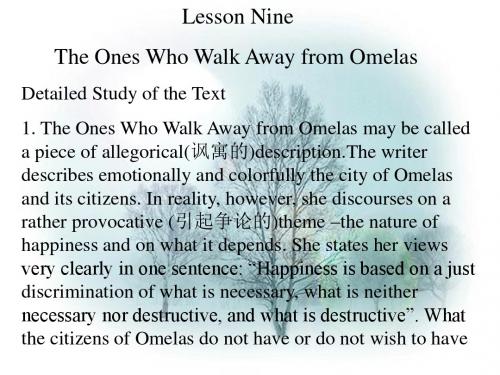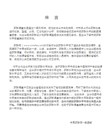高级英语上讲义Lesson9
- 格式:doc
- 大小:50.50 KB
- 文档页数:7


![高级英语(第三版)第一册第九课 A More Perfect Union(Part I)[精]](https://img.taocdn.com/s1/m/a758f88d9b89680202d8252e.png)



Lesson Nine The trouble with Television一、Words and expressions1. absorb –absorbable v.—adj.v. take in 吸收absorb heat 吸热Plants absorb oxygen. 植物吸收氧气。
absorb knowledge 吸收知识absorbing 吸引人的attractiveabsorptionn. 吸收,专心致志2. allot vt. 分配,分派(-tt-)allot sth. to sb. 把——分配给某人Who will she allot the easy job to? 她把轻活分给谁了?allotmentn. 分配,拨款3. apt adj. –aptlyadv.apt 适当的,恰当的suitable, appropriatean apt quotation 恰当的引用Ⅰ. be apt at doing sth. = be good at sth.He is very apt at programming a computer. 他善于编电脑程序Ⅱ. be apt to do sth. = have a tendency to do sth.易于做什么事情,有做某事的倾向性My pen is rather apt to leak. 我的钢笔爱漏水。
aptly: suitably, appropriately4. august adj. 常作定语,令人敬畏的,威严的full of respect, awe, majestic and imposing5. bequeath: v. bequeath sth. to sb. 把某物遗赠给某人He bequeathed 1000 pounds to charity. 他把1000英镑遗赠给慈善事业。
bequestn. 遗赠,遗产,遗物6. coherent—coherenceadj.—n. 有条理的,前后一致的coherent analysis, argument, descriptionThe government lacks a coherent economic policy. 政府的经济政策缺乏一致性。
高级英语(1)第三版Lesson9AMorePerfectUnion翻译答案Lesson 9 “A More Perfect Union” (Part I)Translation1.他把网上的流传当成一个笑话,不予理睬。
2.马克?吐温的《竞选州长》是一片著名的短篇故事。
3.对于遭受灾难的人们,我们应该毫无保留地帮助他们。
4.考虑到他们没有经验,他们的工作成绩还是相当不错的。
5.她是在华裔人占主导地位的社区里长大的。
6.心情不好不能成为你对同事粗暴的理由。
7.警方把这件事视作“误解”而草草了事。
参考译文1.He dismissed the story circulating on the Internet as a joke.2.Mark Twain’s “Running for Governor” is a famous short story.3.We should reach out without reservation to those who suffer from disasters.4.Given their lack of experience, their work should be considered as above average.5.She grew up in a community where the inhabitants were predominantly of Chinese origin.6.Being in a bad mod cannot justify your rude behavoir toward your colleagues.7.The police dismissed the incident as a case of misunderstanding.。
Lesson Nine The trouble with Television一、Words and expressions1. absorb –absorbable v.—adj.v. take in 吸收absorb heat 吸热Plants absorb oxygen. 植物吸收氧气。
absorb knowledge 吸收知识absorbing 吸引人的attractiveabsorptionn. 吸收,专心致志2. allot vt. 分配,分派(-tt-)allot sth. to sb. 把——分配给某人Who will she allot the easy job to? 她把轻活分给谁了?allotmentn. 分配,拨款3. apt adj. –aptlyadv.apt 适当的,恰当的suitable, appropriatean apt quotation 恰当的引用Ⅰ. be apt at doing sth. = be good at sth.He is very apt at programming a computer. 他善于编电脑程序Ⅱ. be apt to do sth. = have a tendency to do sth.易于做什么事情,有做某事的倾向性My pen is rather apt to leak. 我的钢笔爱漏水。
aptly: suitably, appropriately4. august adj. 常作定语,令人敬畏的,威严的full of respect, awe, majestic and imposing5. bequeath: v. bequeath sth. to sb. 把某物遗赠给某人He bequeathed 1000 pounds to charity. 他把1000英镑遗赠给慈善事业。
bequestn. 遗赠,遗产,遗物6. coherent—coherenceadj.—n. 有条理的,前后一致的coherent analysis, argument, descriptionThe government lacks a coherent economic policy. 政府的经济政策缺乏一致性。
7. condense: v.condense sth. to/into sth. 把——浓缩成——,凝结简缩,摘要condense a long report into a brief summarycondensation n.8. civilize—decivilize9. dismiss:v. Ⅰ.解雇,免除Ⅱ. 对某事不予理会dismiss a suggestionⅢ. reject驳回dismiss a case/an appeal 驳回一个诉案/上诉dismissal n. dismissible adj.10. divert:v.Ⅰ. divert sb. from sth. to sth.转移某人的注意力divert one's attention, energies 转移某人的注意力,精力Ⅱ. entertain, amuse消遣或娱乐divertingadj. 消遣的,娱乐的divertingly adv.diversion n.11. gratify v. esp. passive 常用于被动语态be gratified at/by/with sth. = be satisfiedgratify one's curiosity 满足某人的好奇心gratification n. gratifying adj.be gratifying to do sth./thatgratifyingly adv.12. illiterate—illiteracy adj.—n.13. imperative: adj. 紧急的,必须服从的It is imperative that we make a quick decision. 我们要尽快做出决定。
imperative 作“必须服从的、必要的”时用虚拟语气,should可省略。
n. 必要的事,必须履行的责任Survival is our first imperative. 当务之急的事是生存。
a moral imperative 道德上的责任14. effect—efficient—effective inefficient15. inherent: adj. 内在的,固有的,与生俱来的be inherent in sb./sth.an inherent distrust of strangers 对陌生人天生的不信任inherently adv.16. miracle = wonder 奇迹,美妙miraculous = wonderful17. perpetual: adj. 永久的,永恒的,不间断的,连续的,反复的permanent, continuous, repeated, continual, incessantperpetually adv.18. pervade –invade—evadev. 弥漫,渗透spreadThe smell pervades the house.Her work is pervaded by nostalgia for the past.她的作品充满了怀旧之情。
pervasion n.pervasive adj. = pervading 无处不在的,遍布的19. scrape—scrap v. —n.20. a series of = a chain ofserial adj./n.21. usurp: 篡夺,夺取usurp the throne 篡夺王位usurpation n. usurper二、TextTitle: A prominent anchorman warns of TV's adverse effect on America's culture by Robert MacNeilprominent: 突出的,杰出的 projecting, distinguished, outstanding, well-known prominent cheek-bones 突出的颧骨hollowedplay a prominent part in the public life 在公共事务中起突出作用杰出的政治人物 a prominent political figureadv. prominently n. prominence近来崭露头角的青年作家 a young writer who has recently come to/into prominence warn sb. of sth. = admonishadverse: adj. 相反的,不利的,敌对的,有害的contrary, hostile, opposing, harmfulthe adverse effects of drugs 药品的副作用adverse weather conditions, circumstances 不利的天气,逆境adversely adv.Structure of the text:Paragraph Ⅰ, Ⅱ: the influence of television—dominate people's life—work on bachelor's degree, astronomer or engineer, learning languages, reading, walking and writing.It is difficult to escape the influence of television. If you fit the statistical averages, by the age of 20 you will have been exposed to at least 20,000 hours of television. You can add 10,000 hours for each decade you have lived after the age of 20. The only things Americans do more than watch television are work and sleep.fit 适合,适当be exposed to 暴露于Calculate for a moment what could be done with even a part of those hours. Five thousand hours, I am told, are what a typical college undergraduate spends working on a bachelor's degree. In 10,000 hours you could have learned enough to become an astronomer or engineer. You could have learned several languages fluently. If it appealed to you, you could be reading Homer in the original Greek or Dostoyevsky in Russian. If it didn't, you could have walked around the world and written a book about it.教材P134 2. What other things could a person possibly have done in those hours spent on watching TV?calculate: countfluently 流利地appeal to 恳求,呼吁;吸引某人;投诉、起诉某人Paragraph Ⅲ: the trouble—to discourage concentration, apply no effort, instant gratification, divert, distractThe trouble with television is that it discourages concentration. Almost anything interesting and rewarding in life requires some constructive, consistently applied effort (付出努力). The dullest, the least gifted of us can achieve things that seem miraculous to those who never concentrate on anything. But television encourages us to apply no effort. It sells us instant gratification. It diverts us only to divert, to make the time pass without pain.concentration 注意力教材P134 3. In what way does TV discourage concentration?It sells us instant gratification. It diverts us only to divert, to make the time pass without pain.Paragraph Ⅳ: narcotic—following its lead—guided tour—passively surrenderTelevision's variety becomes a narcotic, not a stimulus. Its serial, kaleidoscopic exposures force us to follow its lead. The viewer is on a perpetual guided tour: 30 minutes at the museum, 30 at the cathedral, 30 for a drink, then back on the bus to the next attraction-except on television, typically, the spans allotted are on the order of minutes or seconds, and the chosen delights are more often car crashes and people killing one another. In short, a lot of television usurps one of the most precious of all human gifts, the ability to focus your attention yourself, rather than just passively surrender it.on tour 在旅行中spans 跨度focus one's attention 集中注意力surrender 屈服,放弃Paragraph Ⅴ, Ⅵ, Ⅶ: appeal to the short attention span—a few moments' concentration—value: fast ideasP134 4.Why is the appeal to the short attention span so important to TV?Capturing your attention-and holding it-is the prime motive of most television programming.Capturing your attention-and holding it-is the prime motive of most television programming and enhances its role as a profitable advertising vehicle. Programmers live in constant fear of losing anyone's attention-anyone's. The surest way to avoid doing so is to keep everything brief, not to strain the attention of anyone but instead to provide constant stimulation through variety, novelty, action and movement. Quite simply, television operates on the appeal to the short attention span.constant 不断的infear of 害怕appeal to 吸引It is simply the easiest way out. But it has come to be regarded as a given, as inherent in the medium itself; as an imperative, as though General Sarnoff, or one of the other august pioneers of video, had bequeathed to us tablets of stone commanding that nothing in television shall ever require more than a few moments' concentration.way out 解决问题的办法pioneer 先驱bequeath to usIn its place that is fine. Who can quarrel with a medium that so brilliantly packages escapist entertainment as a mass-marketing tool? But I see its values now pervading this nation and its life. It has become fashionable to think that, like fast food, fast ideas are the way to get to a fast-moving, impatient public.in one's place 各就其位,适当的Paragraph Ⅷ: inefficient communication—not absorbable or understandable, scraps, boring and dismissableIn the case of news, this practice, in my view, results in inefficient communication.I question how much of television's nightly news effort is really absorbable and understandable. Much of it is what has been aptly described as “machine-gunning with scraps.” I think the technique fights coherence. I think it tends to make thingsultimately boring and dismissable (unless they are accompanied by horrifying pictures)because almost anything is boring and dismissable if you know almost nothing about it.in the case of 在…情况下,就…来说fight 破坏dismissable 不予理睬的Paragraph Ⅸ: decivilizing—simplicity—visual stimulation—precision is anachronism教材P134 6. Why does the author say TV is decivilizing?I believe that TV's appeal to the short attention span is not only inefficient communication but decivilizing as well. Consider the casual assumptions that television tends to cultivate: that complexity must be avoided, that visual stimulation is a substitute for thought, that verbal precision is an anachronism. It may be old-fashioned, but I was taught that thought is words, arranged in grammatically precise ways.Paragraph Ⅹ, Ⅺ: a crisis of literacyThere is a crisis of literacy in this country. One study estimates that some 30 million adult Americans are “functionally illiterate” and cannot read or write well e nough to answer the want ad or understand the instructions on a medicine bottle.Literacy may not be an inalienable human right, but it is one that the highly literate Founding Fathers might not have found unreasonable or even unattainable. We are not only not attaining it as a nation, statistically speaking, but we are falling further and further short of attaining it. And, while I would not be so simplistic as to suggest that television is the cause, I believe it contributes and is an influence.The last three paragraphs: call for considerationEverything about this nation-the structure of the society, its forms of family organization, its economy, its place in the world-has become more complex, not less. Yet its domination communications instrument, its principal form of national linkage, is one that sells neat resolutions to human problems that usually have no neat resolutions. It is all symbolized in my mind by the hugely successful art form that television has made central to the culture, the 30-second commercial: the tiny drama of the earnest housewife who finds happiness in choosing the right toothpaste.neat 未搀水的When before in human history has so much humanity collectively surrendered so much of its leisure to one toy, one mass diversion? When before has virtually an entire nation surrendered itself wholesale to a medium for selling?surrender: spend 花费Some years ago Yale University law professor Charles L. Black, Jr., wrote: “…forced feeding on trivial fare is not itself a trivial m atter.” I think this society is being forced-fed with trivial fare, and I fear that the effects on our habits of mind, our language, our tolerance for effort, and our appetite for complexity are only dimly perceived. If I am wrong, we will have done no harm to look at the issue skeptically and critically, to consider how we should be resisting it. I hope you will join with me in doing so.feed on 以…为食三、Exercises教材P1347. Why does the author say that television cannot provide right solutions to human problems?Because the world is complicated, and television could only provide easy resolutions.8. What do you think is the author's purpose in making this speech?He hope we can join with him in resisting the adverse effect of television.D. Choose the right word or expression in the brackets to complete each of the following sentences:1. The teacher(allotted, divided) the children into several small groups for the trip to the Place Museum.divided2. Around mid-night, she received a (mysterious, miraculous)phone call from someone she did not know of.mysterious3. Do you think soil samples are(obtainable, absorbable)from the Mars by an unmanned aircraft in the near future?obtainable4. She was so dear to him that he still kept her picture in a(preeminent, prominent)position on his desk.Prominentpreeminent 指卓越的,优秀的;prominent指突出的,如位置等的突出5. A soft background music will(enhance, increase)a delicious meal.Enhanceenhance 指增强效果,提高质量;increase指数量上的增加6. He was so disappointed when the manager said that his plan was completely (dismissable, disposable).dismissable7. The baby-sister kept the kids(accompanied, company)until we got back from the theater.accompanied8. Will the financial(reverse, adverse)prevent you from taking a holiday this summer?Reverseadverse adj. 不能用在本句中F. Translate the following into English:人们的注意力跨度很短,因此,为了抓住观众的注意力,电视必须通过多样化、新奇性和动作不断地提供刺激。